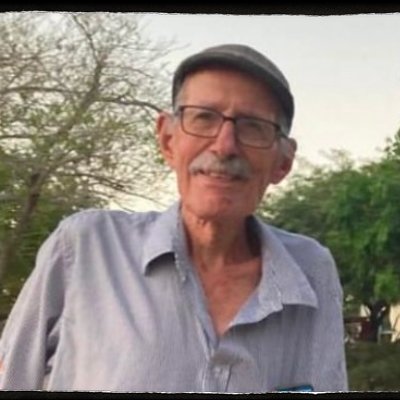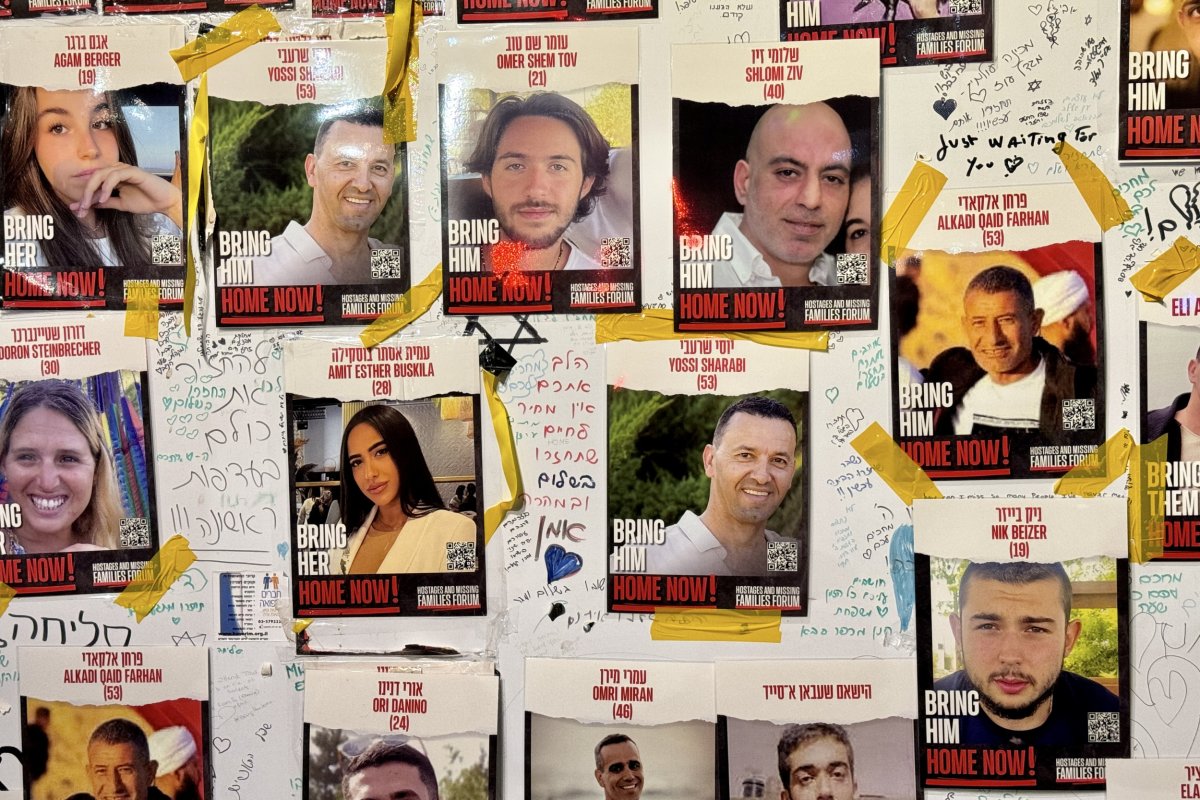The pain struck deep for Sharon Lifshitz as the truce between Israel and Hamas broke down early this month.
Her 85-year-old mother, Yocheved, had been among the first hostages to be freed by Hamas during the brief halt in hostilities to swap some of the captives it seized in its unprecedentedly bloody October 7 raid on Israel in exchange for Palestinian security prisoners held in Israeli jails. Her 83-year-old father, Oded, is still in Gaza somewhere. She does not know if he is alive.
“Our loved ones are dying slowly in Gaza. My father is probably a mile from here. He’s not far, he’s not in another world. You can walk it in half an hour,” Lifshitz told Newsweek in the burned ruins of her parents’ house in Kibbutz Nir Oz, just three fields away from the Gaza Strip. “They are there. They are dead or they are dying. We don’t even know,” she said.
“If a ceasefire is the way, then why start the fire again?” she asks, tearing up as she speaks. “Why are they not back? Why are we not turning every stone? Why are we not saying ‘Yes we will do what we take to get them home?'”
“We are being failed at the moment, I feel, by all agencies, by all governments and especially the Israeli government,” she said. “We do not have this time.”
Matthew Tostevin for Newsweek
Like many other family members of the 137 hostages still held in Gaza, she is not convinced that Prime Minister Benjamin Netanyahu and his war cabinet are doing all they can to prioritize getting their relatives out over the other mission of destroying Hamas in a war that has brought devastation to Gaza and killed thousands of Palestinians.
Red Cross Accused
The anger of the hostage families with Netanyahu is equaled only by that for the International Red Cross, which they say is failing to fulfill its mandate of visiting prisoners and ensuring they are cared for by their captors. The youngest two hostages reported are 10-month-old Kfir and four-year-old Ariel Bibas.
“Where is the international community?” asks Ruby Chen, whose 19-year-old son Itay Chen was seized from a military base by Hamas, which ultimately aims to wipe Israel from the map and replace it with an Islamic state.
Newsweek contacted Netanyahu’s office and the International Committee of the Red Cross (ICRC) for comment by email.
Hamas warned on Sunday that no hostage would leave Gaza alive unless its demands were met, according to the AFP news agency.
Israel has faced previous hostage dilemmas in decades of wars, but never on such a scale and never at the same time as being engaged in a war that many Israelis see as being about the very existence of the state.
The Lifshitz couple were seized within minutes of the gunmen storming into Nir Oz, a farming community famed for its botanical gardens where they had lived for 65 years. Yocheved was bundled away like a carpet on the back of a motorbike. Oded’s hand was injured in the attack and he was beaten, before being dragged off to Gaza.

The Hostages and Missing Persons Families Forum
Like many of the hostages, they were leftists who believed in making peace with the Palestinians, their daughter says. Her father had friends in Gaza and even at his age he still volunteered to ferry Palestinians to hospital for treatment.
At least 46 people were killed in the attack on Nir Oz, more than a tenth of its population.
Now the posters of the missing are pasted to the doors of empty homes. The ground trembles from sporadic detonations in Gaza. Drones hum constantly overhead. An occasional warning of incoming rockets sounds a Code Red over the kibbutz speakers.
At least 1,200 Israelis were killed in the Hamas attack. More than 18,000 Palestinians have been killed in the subsequent Israeli offensive, health authorities in Hamas-run Gaza say. Many have been the victims of bombing that the relatives of the hostages fear could kill them too.
“We can’t think we will destroy Hamas and get these people back. They will destroy our people with Hamas,” says Lifshitz.
Held in Tunnels
After being freed, her mother told of being held in a “spider’s web” of tunnels where the fighters hole up for protection. Those are a target for bombing from the air and demolition on the ground. There has been talk of flooding some with sea water—an agonizing prospect the families.
Freed hostage Clara Merman, 63, said “It is inconceivable to remain there without the possibility of seeing day or night, not knowing if you’re going to eat or not, if a bomb might suddenly fall.”
Reminders of the hostages are everywhere in Israel from the posters on walls to yellow ribbons on lampposts and trees. Thousands of people rallied in Tel Aviv on Saturday to call on the government to do more to get them home. A chorus rose up to demand the release of the hostages: “All of them. Now”.
The message spelled out by the families to Netanyahu and other Israeli leaders is: “Your future is tied to their fate”.

Matthew Tostevin for Newsweek
For the families, it should take priority over everything else—even if that means another ceasefire or if it means releasing Palestinian prisoners “with blood on the hands” for killing Israelis.
The Israeli government has said it remains focused on securing the release of the remaining hostages. “The war is continuing, intensively, in both northern and southern Gaza, in order to achieve all of our goals: Eliminating Hamas, returning all of our hostages and ensuring that Gaza will never go back to being a threat to Israel,” Netanyahu told a government meeting on Sunday.
Defense authorities have argued that Hamas will only negotiate when it is under military pressure. Israel accused Hamas of violating the brief truce by failing to come up with a promised list of hostages for release and carrying out rocket attacks. Its offensive renewed in full force.
Angry Meeting
The anger of the families flared during a meeting with Netanyahu last week, according to Israeli media reports. At points, some relatives shouted “shame”. One called Netanyahu “irresponsible” and “heartless”. Another described his words as “nonsense” as he said the price that Hamas sought was too high—though without giving details.
“As a father, is there a price that’s too high for you?” asked New York-born Chen, whose teenaged son had been doing his obligatory military service when he was abducted. “The Israeli government should take us representatives of the hostages families, explain to us what is that price and we should be part of that decision process. If you’re making a decision on my kid, you tell me what that price is.”

The Hostages and Missing Persons Families Forum
A poll in late November rated the return of the hostages as by far the top priority for Jewish Israelis, with 49 percent choosing that over the 32 percent who put toppling Hamas first. But the dynamics of this conflict are different to previous ones and there has so far been general acceptance of the steadily rising Israeli military death toll.
For many years, Israel refused to negotiate with hostage-takers and rather to attempt to rescue them, but that changed in the mid-1980s when over 1,100 prisoners were freed in exchange for three soldiers captured in fighting in Lebanon. More than 1,000 prisoners were freed in 2011 for Gilad Shalit, a soldier abducted into Gaza in 2006.
During the recent temporary truce, Hamas released 105 hostages for 240 Palestinian prisoners.
For those who remain, their families are demanding more action from the International Committee of the Red Cross to visit them and ensure that they are properly cared for right now. They, and the Israeli government, have said the agency is not doing enough.
Families were angered by the sight of ICRC President Mirjana Spoljaric in Gaza speaking in impassioned social media posts about the human suffering there, about the shocking injuries to children and by what she described as the moral failure by the international community over the conflict without placing as much emphasis on the plight of the Israeli hostages.
According to Israeli media, the parents of one hostage were told by an ICRC representative to think of the Palestinians too, when they asked about getting medical help to their daughter.
The ICRC helped facilitate the earlier hostage releases and has repeatedly called for the freeing of all hostages. Spoljaric has said that the organization will continue to urge Hamas and all with influence to allow the ICRC to have access to the hostages.
Israel has called for more action from the ICRC. U.S. Secretary of State Antony Blinken spoke to Spoljaric at the weekend and highlighted the need for the ICRC to be granted access to the remaining hostages, the State Department said.
“I agree there is also a humanitarian crisis in Gaza, but what about those 1,200 who were killed and those still held in captivity?” said Chen, reeling off details of the Red Cross mandate to address the welfare of war captives on his mobile phone.
“All the hostages have not been visited. No medical attention. There are those that are wounded with gunshots, arms have been amputated. Isn’t that their job?” he said. “Time is running out.”
Uncommon Knowledge
Newsweek is committed to challenging conventional wisdom and finding connections in the search for common ground.
Newsweek is committed to challenging conventional wisdom and finding connections in the search for common ground.


